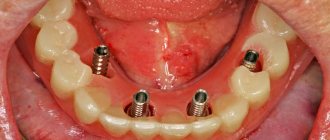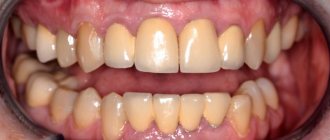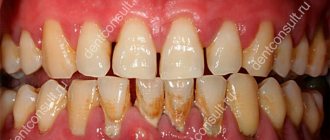Implantation is recognized as an advanced method for restoring lost teeth. This popular technique is used by dental centers all over the world. Manufacturers from different countries produce high-quality structures for implantation that restore the dentition and aesthetic qualities of a smile.
Many patients have heard about the benefits of installing implant systems, but not many know about the disadvantages of such treatment. In the article we will consider all the disadvantages of dental implants, reviews
patients and possible health risks after the procedure.
General information about the dental implant procedure
The essence of implantation is the restoration of a lost tooth or several units in a row by implanting an artificial root into the jaw bone, followed by installing a dental crown on the implanted pin.
Dental implantation takes place in several stages:
1. Examination and preparation of the patient’s oral cavity. In the presence of caries and other dental diseases, implantation is not performed. Initially, diagnostics are performed using hardware techniques, then the doctor carries out all the necessary treatment procedures to eliminate the identified diseases. If the patient has chronic diseases of various organs and systems of the body, he will also have to undergo an examination by specialized specialists, who must give an opinion on the possibility of safe dental implantation.
2. At the second stage, dental implants are implanted
. This is a surgical procedure performed under anesthesia during which the doctor implants an artificial root into the jaw bone and installs a temporary crown.
3. Several months should pass after the second stage. This time is allotted for the complete engraftment of the artificial root. If during this period the patient does not experience complications, the implantation is completed with the installation of a permanent crown. Externally, such a tooth cannot be distinguished from a real one. It also performs all chewing functions and withstands the various stresses associated with eating solid food.
Dental implants vary in shape, material and other technical parameters.
What are the types of dental implants
there are:
1. By installation method: intraosseous, extraosseous, mini-implants, cortical, basal, zygomatic.
2. By type of thread: compression, self-tapping, combined.
3. By type of material: titanium, zirconium, ceramic.
4. According to the size of the artificial root: short up to 10 mm, classic - within 20 mm, elongated - over 20 mm.
5. Shape: cylindrical, root-shaped, disk, combined, lamellar.
Before installing an artificial tooth, the patient needs to decide on the choice of implant, listening to the recommendations of the attending physician.
Surgery and postoperative period
The process itself will be painless and short-lived - you will be given good local anesthesia and the implant will be quickly installed. But even here there is a pitfall: you may need an operation called a sinus lift.
— implantation of artificial bone if yours has atrophied. The procedure is short but expensive. It is usually carried out during implantation in the area of the upper front teeth.
Gennady, the operation took place in 2011:
“Immediately after the operation they will not let you go home - they will give you ice and force you to hold it against your cheek for 20-30 minutes.
Be prepared to take antibiotics. To prevent infection, the doctor will prescribe you a whole course. Talk to your gastroenterologist about restorative therapy in advance. In any case, I simply needed a gastroenterologist for my pancreas.” Elena, the operation took place in 2012:
“Don’t wait until the anesthesia starts to wear off—take a painkiller.
Otherwise, you will have to experience severe pain that will not go away within 2-3 days. During this time, take any pain medication your doctor prescribes or that usually works for you. Don’t torture yourself - your pain is not needed by anyone, and, above all, by yourself. I had to take a long sick leave to come to my senses...” Temperature, weakness, swelling, numbness, inflammation are your possible companions. The best thing you can do for your body after surgery is to establish bed rest, at least for 1-2 days, and preferably for 3-5. Do not go to crowded places, do not play sports or lift heavy objects, do not sunbathe.
In the first week, establish a diet - exclude salty, spicy, sour, and hard foods. Forget about alcohol!
The next day, a week, a month later - control x-rays to monitor the process of implant healing and the absence of complications. Here you can expect: suture dehiscence, reimplantitis (inflammation of the bone tissue around the implant), implant rejection. Then the process will last for several more weeks - in the worst case, the implant will have to be reinstalled. Be prepared for this situation as well.
Anna, both operations took place in 2013:
“Honestly, there were several moments when I wanted to give up everything.
It seemed to me that doctors were playing it safe, and without any reason. I was afraid to go to the appointment and take a picture, because I didn’t want to hear the phrase “Come back in 2 weeks, it’s too early.” I had the implant installed again, and I was ready to give up my idea. But I was well supported by my husband, parents, nurses and the doctor himself - and when, finally, everything was left behind, I was happy. Previously, it seemed to me that I would never dare to do this again, but now, after 2 years, I am beginning to understand that nothing could be better than an implant...” Follow all the doctor’s recommendations, then the risk will be minimal. Do not hesitate to arrive before your appointment, or call the clinic if your condition worries you.
Approximate costs at this stage:
- Operation to install an implant (possibly repeated) – from 25 thousand rubles
- Sinus lifting (possibly) – from 20 thousand rubles
- Control x-rays – from 1000 rubles, depending on the required quantity.
- Necessary medications – from 2 thousand rubles
What are the contraindications to the procedure?
Not every patient can have dental implants, due to a number of contraindications.
Contraindications to implantation:
- diabetes mellitus type II;
- cardiovascular pathologies;
- AIDS, HIV;
- hepatitis;
- open tuberculosis;
- bruxism;
- malocclusion;
- inflammatory diseases of the oral cavity;
- poor blood clotting;
- low immunity;
- mental illness;
- oncology;
- venereal diseases;
- allergic reactions.
Implantation is not performed during pregnancy, lactation, during exacerbation of chronic diseases, or in patients under 20 years of age.
Is it true that implants are installed for life?
Indeed, such a judgment exists, but it is only partly correct. Practice shows that economy class implants last 15 years, while middle class implants can last up to 25 years with careful care. Only some premium implant manufacturers offer a lifetime warranty on their products.
However, keep in mind that dental crowns placed on implants do not last as long. Their service life depends on the type of material from which they are made, and, of course, on the careful treatment of them. Manufacturers provide a guarantee of up to 20 years for dental crowns made of zirconium dioxide, while ceramic crowns last a maximum of 7 years, and even then with careful care.
Rehabilitation period
After installation of the artificial root, a rehabilitation period begins, which is quite painful for the patient.
Symptoms that occur during the rehabilitation period:
- severe pain in the oral cavity;
- swelling and hyperemia of the gums;
- bleeding from gum tissue;
- increase in body temperature.
If the outcome is favorable, all of the above symptoms disappear a few days after the procedure. If relief does not occur, the pain intensifies, purulent discharge or other unfavorable symptoms appear, the patient needs to urgently visit the attending physician, as these signs indicate the addition of a bacterial infection.
Is it true that the more expensive the implant, the more reliable it is?
Artificial dental roots (implants) are usually divided into three categories. These are implants of premium, economy and medium classes. It is clear that premium class implants are the most expensive. These products are made only from pure titanium or zirconium. They are easier to install and are practically not rejected by the body. The range of premium implants is very wide. Cheaper implants are made of titanium alloys and therefore cost significantly less. Their service life is much shorter than that of premium implants.
What not to do after implantation?
After installation of a dental implant, the patient must responsibly follow all prescriptions and recommendations of the treating dentist.
Basic rules and prohibitions:
1. To avoid the development of infections in the oral cavity during the postoperative period, the patient needs to carefully care for the oral cavity, take medications as prescribed, avoid alcohol intake, and consume warm soft foods and drinks.
2. Avoid any physical activity for a week after implantation.
3. The dental implant must not be subjected to mechanical stress.
4. For some time after the procedure, you cannot visit the bathhouse or sauna; the patient must avoid overheating and hypothermia.
5. If the first signs of complications or implant rejection appear, immediately consult a doctor.
How often does the body reject an implant?
When dental implantology first appeared, cases of implant failure were common. This was due, on the one hand, to the little practical experience of the dentists of that time, on the one hand, and to insufficiently high-quality implants, on the other.
Nowadays, implant failure is extremely rare. Firstly, over half a century of the technology’s existence, enormous experience has been gained. Dentists at prestigious clinics almost never make mistakes during the preparation and performance of operations. Secondly, modern implants are made from biologically inert materials that the body does not perceive as something foreign. These are titanium, titanium alloys, and zirconium. Zirconium implants are the most expensive.
At the same time, there is still a negligible risk of implant rejection. This can happen due to the fault of an inexperienced surgeon, due to non-compliance with the doctor’s recommendations in the postoperative period, or due to emerging diseases.
Is it possible to do MRI diagnostics if you have a dental implant?
Many patients have the following question: is it possible to have an MRI with a dental implant?
? Dental implantation is not a contraindication to MRI diagnostics. Some structures made of non-inert metals may distort the results of the study.
In order for the diagnostician to correctly set up the MRI machine, the patient must show documents (special passport) received at the dental center, which will contain all the information about the installed dental implant.
How expensive is implantation of artificial tooth roots?
Dental implantology is developing rapidly, and more and more clinics are mastering this technology. Both help reduce the cost of surgery. The same picture is observed among implant manufacturers. The average price of one implant today is comparable to the cost of a dental prosthesis made of metal ceramics or zirconium.
It should be borne in mind that even the highest quality dentures last a maximum of 5 to 7 years. After this they have to be changed. At worst, implants last 15 years.
Dental implantation at Aesthetics dentistry
Despite the disadvantages of implantation, this method of restoring lost units is still considered the best and most effective. The dental clinic employs highly qualified doctors who perform high-quality dental implantation with minimal risks of complications. This is confirmed by positive patient reviews.
The specialist conducts a competent examination of the patient’s oral cavity, studies personal history, and only then makes a decision on possible dental implantation, without adverse consequences for the patient.
The center uses high quality implants from the world's best manufacturers. All patients who leave reviews on the site are given a 3% discount on dental implantation and other dental procedures. The first consultation examination is free!
Implant aftercare
You are happy about your new teeth, but do you remember the first conversation with the doctor, even before the whole procedure began? He told you about mandatory oral hygiene, using special means:
- Toothbrush: at least 2 times a day and after every meal. Brush your teeth using massaging movements, alternating circular and sweeping movements.
- Dental floss (floss, superfloss). The spaces between teeth must be cleaned, otherwise plaque that is harmful to implants will accumulate there.
- Irrigator. Be sure to purchase it, because the irrigator is the savior and friend of your implants. A needle-thin stream of water will clean plaque from the area where the crown adheres to the gum, get rid of the unpleasant odor and prevent the destruction of the crown.
- Professional hygiene. Now you are a regular client of the dental hygienist. Once every six months you definitely (required!!!) need to do professional hygienic cleaning: ultrasonic plaque removal and AirFlow treatment
Alena and Konstantin, operations took place in 2015:
“We placed implants together, supported each other. Everything went well, and we understood that now we are more responsible for our teeth than before. After all, once we didn’t save them - we lost them, so now, having spent so much money and effort on implantation, I would like to observe the result for as long as possible. In general, a lot depends on the person himself: whether he smokes, whether he drinks often, whether he cares about his health... Previously, brushing your teeth took 2-3 minutes, now it takes 10-15, because you need to go through everything with an irrigator and floss..."
Factors affecting service life
Having decided to undergo implantation, you must first familiarize yourself with all the requirements for the reliability of products. The average service life of dental implants is 15 years, but when counting on installing a reliable design, you need to understand that the cost will not be cheap.
Criteria for the characteristics of implants:
- strength - resistance to constant loads;
- product quality;
- type of production technology;
- material of manufacture;
- installation method.
A major role, as already mentioned, is played by the patient’s health status. Before implantation, oral approval should be performed. The presence of even minor inflammation or caries suggests a risk of implant rejection.
An important point is the professionalism of the doctor. if the structure itself is not installed securely, then most likely the pin will move or fall out.
Manufacturer and Dental Warranties
When implanting, it is better to know well-known manufacturers that have positive reviews. As a rule, you can always find information about certain implants and how long the products of a given manufacturer last. However, it is worth considering that dentistry and the manufacturer give different guarantees, since the manufacturer is based on the characteristics of the product, and the dental company takes into account the operating conditions.
Implants come in budget, medium and premium classes. Manufacturers such as AstraTech, XIVE Friadent and Nobel provide a lifetime guarantee; their products are premium and have increased strength and healing rates.
Average-priced implants have a service life (from the manufacturer) of an average of 20 years. The manufacturer's warranty for artificial roots is no more than 10 years.
Dentists, as a rule, establish a guarantee of no more than 3 years, since patients often do not follow the doctor’s recommendations for care throughout the entire period of use. The guarantee provided is confidence in the work done by the doctor.
Implantation is not possible if the bone has atrophied
Insufficient bone tissue becomes an absolute contraindication in very rare cases . You can install an implant by first increasing the bone volume. This is necessary to prepare the place where the rods will be fixed. There are many ways to solve the problem of atrophy. Some implantation techniques even involve simultaneous installation of an implant with extension.
Bone grafting in the upper jaw is called a sinus lift. It is aimed at shifting the bottom of the nasal sinus upward, replanting osteoplastic material to create the required bone thickness.
Myth 1. “It hurts.”
Anesthesia reduces pain and discomfort during implant installation to almost zero. It is introduced in stages, before performing the manipulations the doctor will make sure that the desired area is insensitive. Installing an implant is a quick procedure; the freezing will not have time to go away.
If an impressionable person sits in the implantologist’s chair, it is difficult for him to bear the sight of blood, the sounds of implants being implanted into the bone, etc., but we are not talking about severe pain.
In some clinical cases, the patient is put into deep medicated sleep, relieving pain and fear.
Irina Fedenko, Moscow
“When I came for a consultation about dental implantation, I was very interested in the question of how painful it was. The doctor asked me what dental procedures I had had in my life. I answered that I naturally treated caries, about 10 years ago I had an unerupted wisdom tooth removed, and they also removed a cyst on the root of the tooth - the tooth itself was saved. Then they told me that problematic tooth extraction and tooth-preserving surgery are more invasive procedures compared to implantation. Therefore, this time there will be less discomfort. Now having experience, I can say that implantation is only scary psychologically, there is no severe physical pain. Although after the operation I naturally suffered for a couple of days. The cheek was swollen, the eye was swollen, the stitches itched and throbbed. But it’s not scary anymore.”
Is there a high risk of implant failure?
Even at the dawn of dental implantology (50-60 years ago), the majority of dental systems took root well. Over decades of their use, significant experience has been accumulated in production and installation technology. Complications in the form of peri-implantitis are rare, since the rods are made of bioinert materials (titanium and its alloys, zirconium). Products are characterized by:
- strength;
- resistance to mechanical loads;
- anti-corrosion properties;
- hypoallergenic.
A slight risk of developing rejection is possible due to the lack of professionalism of the doctor , so you need to take your choice of clinic and implantologist seriously. Failure to follow medical recommendations and the development of other diseases years after implantation can also lead to peri-implantitis
Caring for implanted teeth is difficult
Implants do not require special care, but crowns and dentures must be thoroughly cleaned. It is recommended to use additional cleaning products:
- irrigators;
- floss;
- rinse aids.
They allow you to fight plaque in hard-to-reach places, especially in the area where the crown comes into contact with the gum. When caring for a conditionally removable denture, it is recommended to use dental brushes.
Question 4: Is it possible to install several implants at once?
Yes, you can. But quantity plays a role. For example, surgeons place one or two artificial roots at a time.
It is always worth remembering that implantation is a surgical intervention and stress for the body. In order not to overload your health, the surgeon draws up an implantation calendar, where he clearly states the dates of operations. This will distribute the load on the body.
Note! There is no need to rush to insert all the missing teeth at the same time. Let this process be systematic. By waiting a few months, you will receive guarantees that the roots will take root reliably and withstand all the load that will fall on them.
Bridges are better than implants
Everything is very individual. In some cases, implantation may not be possible. And then specialists offer patients traditional dentures. However, when comparing these prostheses with implants, you can see that the latter have more advantages.
To install a classic bridge, preliminary grinding of adjacent teeth and removal of nerves is carried out. As a result, it turns out that to restore one tooth, you have to “injure” two more healthy teeth.
If we talk about removable dentures, they are noticeable on the teeth, often cause discomfort, and negatively affect bone tissue due to the lack of the necessary load.
Dental implants – what are they?
Dental implants, implants, implants are all artificial structures that replace missing teeth. They are firmly fixed in the bone tissue of the jaw and serve as a reliable support for fixed or removable dentures in the form of single crowns and bridges of varying lengths (you can see what dental implants look like in the photo above). There are several types of dental implants, but the most popular today are root-shaped dental implants, which have earned favorable reviews from both patients and leading implantologists around the world. Prices for dental implants depend on their quality, features of the installation system, the presence of special coating and other factors. Which implants are better is a topic for a separate article.
Photo of a dental implant
Question 5: Are there any age restrictions?
There are practically no age restrictions for dental implantation. Implants are allowed to be placed in young patients after the final formation of the dental system (about 18 – 20 years), and in adults, teeth can be implanted at 70 and 90 years.
If a child under 18 years of age needs to place an artificial pin instead of a molar, the dentist may suggest using a temporary implant and after a while placing a permanent one.
Installing implants is a painful procedure
The myth about the pain of implantation arose from the opinion that drilling into the bone leads to damage to nerve endings that, in reality, are not there. During the operation, the patient may experience minor discomfort. At the postoperative stage, there is discomfort in the suture area. In general, implantation is no more painful than treatment of caries or tooth extraction through the use of anesthetics. In difficult cases, when installing 6 or more rods, general anesthesia can be used. Strong feelings of fear and anxiety before surgery are eliminated with sedatives.
- Complete restoration of the dentition in just 4 days!
more detailsRoott Pterygoid Implants Sinus lift is no longer needed!
more details
Once and for life! Express implantation in 4 days with a permanent ReSmile prosthesis
more details
All-on-4, All-on-6, ReSmile, Zygomatic implantation We use all modern methods of dentition restoration
more details
Once the freezing effect wears off, there is often no need to take additional painkillers. Minor discomfort occurs due to damage to the tissue of the mucous membrane, but it lasts no more than 2-5 days.
An implant is an imitation of a tooth with a root system.
The implant imitates only the main part of the tooth, which is visible from the outside, but it does not have a root system. Instead, all the main functions are performed by a special titanium pin, which is fixed in the tissues and holds the entire prosthesis.
There is simply no point in visually simulating the root system. Firstly, it is not visible (only on an x-ray). Secondly, it is enough to imitate the main part of the tooth.
Is there an absolutely bloodless operation?
The concept of a “completely bloodless” implant installation is somewhat exaggerated. The transgingival method involves installing an implant without cutting the gums or applying sutures. This operation is less traumatic than the classic one. Helps reduce the severity of postoperative complications and shorten the rehabilitation period. It is performed through a puncture of the gum.
The technique is indicated for one-stage implantation, during which the implant with a crown is installed in a maximum of 5-7 days.
Minimally invasive implantation is indicated:
- if it is necessary to quickly restore the frontal units;
- with a narrow alveolar ridge;
- with complete edentia against the background of slight bone atrophy.
The accuracy of installation of structures is ensured by the preliminary production of surgical templates. This reduces the risk of damage to blood vessels, nerves, and neighboring units. The anatomy of the alveolar bone is also taken into account.











